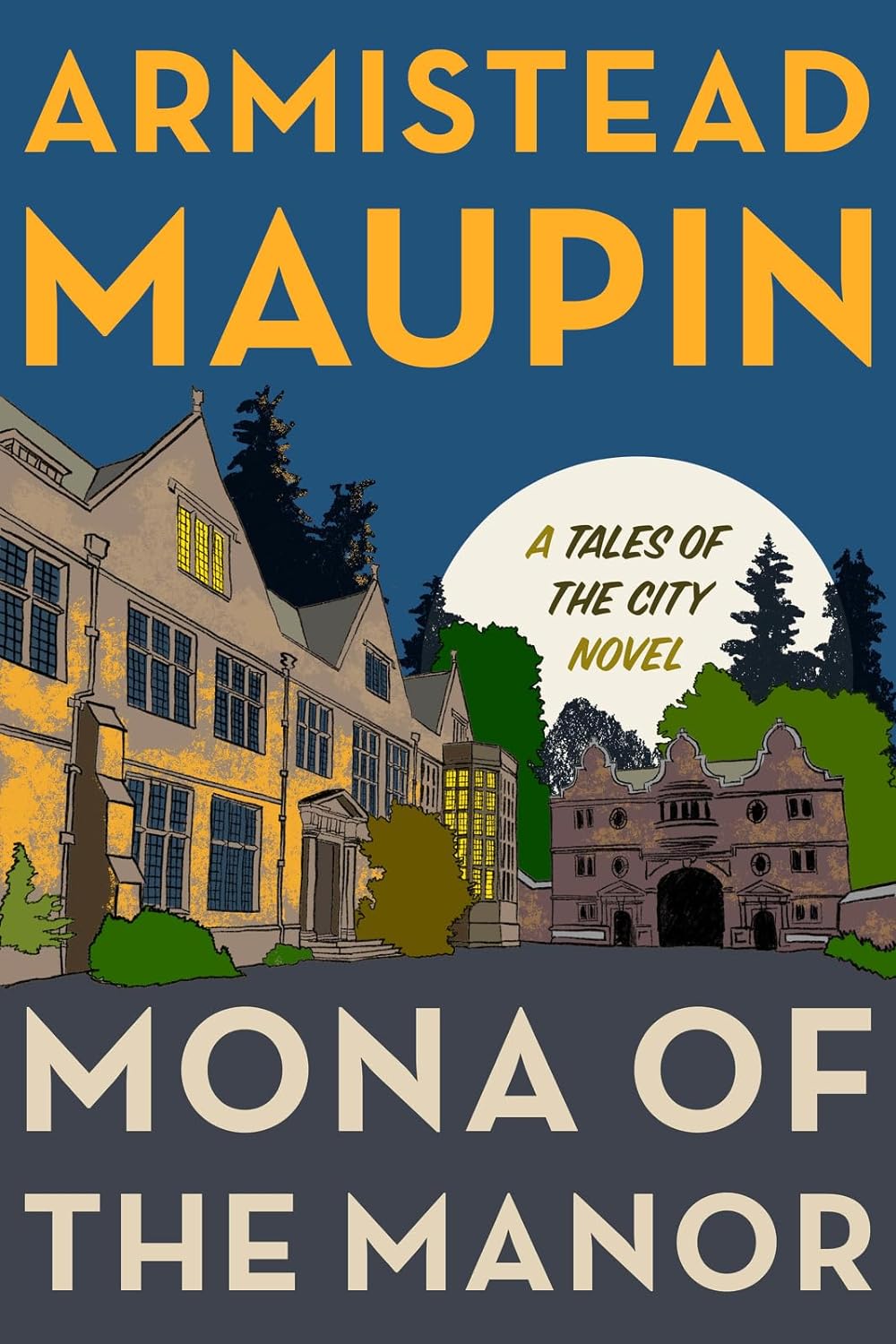Mona of the Manor by Armistead Maupin
What's It About?
Set in the early 1990s, the long-awaited tenth novel in Armistead Maupin’s beloved and enduring Tales of the City series follows the adventures of Mona Ramsey, now the widowed Lady of a glorious old manor in Britain’s golden Cotswolds, and her fabulous adopted son Wilfred, as they come to the aid of an American visitor with a troubling secret.Written by the inimitable Armistead Maupin, Mona of the Manor is a refreshing romp in the Cotswolds, a tale of entrepreneurial ingenuity and a reunion followed by well-deserved retribution.
It is the 10th and final installment of the author’s Tales of the City novels which began fifty years ago in Marin County’s Pacific Sun newspaper in 1974.
The End(?) of a Series with a Long, Rich History
Established in 1967, Pacific Sun is the oldest free weekly alternative newspaper. Two years later the venerable Grande dame newspaper, San Francisco Chronicle, founded in 1865 by the de Young Brothers, began serializing Maupin’s complete first novel, Tales of the City, in a column beginning on May 24, 1976. The compilation was published in book form in 1978.
The practice of serializing the novels in The Chronicle along with articles occasionally freshly written shortly before they went to press, continued for the next three novels: More Tales of the City, Further Tales of the City and Babycakes. The next six went straight to book format interspersed with some long gaps between novels. The Days of Anna Madrigal was published a decade ago in 2014.
It’s not the first time author Armistead Maupin has stated this is “the last one,” but given that he has a myriad of interests including a handsome husband, plentiful speaking engagements and celebrating his 80th trip around the sun in May, it might well be true. Longtime fans and the newest converts welcome Mona of the Manor to bring us up-to-date with the lives and loves of current and former denizens of 28 Barbary Lane, San Francisco, California.
Widow Hosts Starry-Eyed Americans in Decaying English Manor
Lady Mona Roughton, formerly known as Mona Ramsay, the bohemian, iconoclastic and title-less San Franciscan, didn’t imagine at age 48 she would be a widow and sole owner of Easley House, a decaying yet still somewhat grand country manor situated across the pond in England. She was married, in name only, to the flamboyantly gay Lord Teddy who gifted her $5,000 in order to obtain a coveted green card enabling him to remain in “The City” to pursue his interests — primarily hot, younger men.
When this charming and gallant Englishman died of AIDS, he generously bequeathed his entire estate to his legally wed spouse. Among other maintenance requirements, a perpetually leaking roof, monthly upkeep and frightful taxes made it immediately apparent Lady Mona would require paying guests in order to retain her manor and honor Lord Teddy’s memory.
Americans with romantic notions of wildflower-strewn meadows, a charming folly on a hillside, a family chapel and portraits of generations of dour ancestors on the walls filled the bookings. Most managed to ignore the steady plinking of raindrops falling into strategically placed buckets and pots. The Dorchester or Savoy, it clearly is not.
The only paid family retainer was old Mr. Hargis, the gardener since before Lord Teddy was born. He was a bit absented-minded, hard-of-hearing and short-sighted as well as positively obsessed with the idea a gypsy or Roma man was poaching on the estate. Mona and Teddy’s adopted son, a charming gay Australian-aborigine named Wilfred, does most of the cooking for the household and guests who generally assume he is the somewhat inept butler.
Eclectic Ensemble Comes to the Aid of a Woman in Trouble
Ernie and Rhonda Blaylock, a wealthy American couple on vacation from North Carolina arrive for a long weekend. Ernie is foul-tempered, still upset by a perceived snub by arch-conservative Senator Jesse Helms whom he helped to re-elect as well as provided campaign funding. He is straight-laced, homophobic as well as bigoted, and as Wilfred learns by accident, has been beating his long-suffering wife like a drum for the majority of their 34-year marriage.
As a devout Christian who does not believe in divorce, Rhonda feels bound to him for life and has developed a mastery over cosmetics that conceal bruises. She is, however, open-minded, optimistic and starry-eyed about the prospect of spending three nights in an English manor. Mona and the household immediately begin planning to rescue Rhonda from further domestic violence observed by Wilfred.
Meanwhile, they are preparing for a highly anticipated village fete and Midsummer ceremony to be held on the historic grounds of Easley House. To heighten the excitement, Michael Tolliver aka Mouse, recently dumped by his partner, will soon arrive for his first visit to England in several years and bring Mona’s dear parent Anna Madrigal as a surprise. Anna is the cannabis-smoking surrogate mother/godmother and landlady to a long line of present and former tenants of 28 Barbary Lane.
Noted Chronicler of San Fransisco and the LGBTQ+ Experience
Those familiar with the various tangled plot lines of previous Tales know Anna Madrigal’s name is an anagram for “a man and a girl.” Born in a Nevada brothel, Anna is Mona’s birth father and fully accepted as matriarch of this non-biological close-knit family. This central and most beloved character, played by Olympia Dukakis in all three mini-series, is considered a pioneering portrayal of a transgender woman in mainstream literature and television. Readers learn from the dates on the inspirational calendar belonging to houseguest Rhonda that Mona of the Manor is set in 1993.
The long-running saga of this tightly-knit LGBTQ group of friends and family has been translated into at least ten languages. The addition of the three television series, a short-run musical, a documentary and many interviews has increased the visibility of The Tales and its popular author who has served as an informal and highly celebrated Ambassador for the gay community.
Armistead Maupin loosely based the character of Michael “Mouse” Tolliver on some of his own experiences as an openly gay man in San Francisco cut loose from his repressive conservative southern roots. He has expressed in some interviews there is an element of him found in each character.
The first three books in the series are full of fun and frivolity; light-hearted stories concerning the interaction of the main characters as they find their way in the beautiful city by the bay. They were truly the talk of the town starting many a workday in the Financial District. San Francisco Chronicle readers were treated to the author’s impressions of iconic as well as everyday locations including the Marina District’s Safeway, Grace Cathedral, Washington Square Park, the Opera House, and the many gay bars — including the EndUp, The Stud and The Devil’s Herd — trendy restaurants and bathhouses.
Visitors and locals would stroll the two-block pedestrian alley on Russian Hill, Macondray Lane that served as the model for the fictional Barbary Lane. Tales of the City was filled with recurring celebrity and socialite characters, some using real names and others thinly disguised. Part of the fun was identifying them.
Wickedly Amusing, Sometimes Poignant and Always Relevant
The author consistently explores themes of sexual and gender identity, the celebration of Gay Pride, prejudice and the horrific impact of the HIV/AIDS epidemic that ripped through the entire city and country. San Francisco was an early center for the epidemic and also suffered the highest per capita rate of AIDS cases; a staggering 19,000 in the city died of the disease by the end of 2000. Education and the introduction of antiretroviral therapy has made it possible for many to live with AIDS.
Babycakes, the fourth novel in The Tales series, was published in 1984 at a time when the number of patients diagnosed soared along with their death rate. Michael Tolliver’s long-term partner Dr. Jon Fielding sadly succumbed as did many of their friends, acquaintances and colleagues. We also learned Michael is HIV-positive but survived long enough for successful treatments to be introduced.
In Mona of the Manor, Mona and Michael share a brief conversation about friends lost to AIDS with Michael asking, “How many have you lost?” Mona’s response was, “Do we have to keep count?” Michael, “Sorry, I’ve stopped doing that, too.” She then proceeds to recall the number of most recent deaths, for no one who lived through those peak years can ever forget the enormous losses.
“Sooner or later, we have to venture beyond our biological family to find our logical one, the one that actually makes sense for us,” wrote Armistead Maupin in Logical Family: A Memoir (2017), based on his same-named one-man show. This uplifting, enlightening autobiography traced his roots from being a closeted boy in a prominent, conservative southern family to becoming a noted chronicler of the LGBTQ experience.
These inspiring words are affirmed by each novel in this wickedly amusing, addictive, sometimes poignant and always relevant series. Mona of the Manor is a most welcome addition to Tales of the City and we fans of long duration can hold out hope it will not really be the last!
 About Armistead Maupin:
About Armistead Maupin:
Armistead Maupin was born in Washington, D.C., in 1944 but grew up in Raleigh, North Carolina. A graduate of the University of North Carolina, he served as a naval officer in the Mediterranean and with the River Patrol Force in Vietnam. Maupin worked briefly as a reporter for a newspaper in Charleston, South Carolina, before being assigned to the San Francisco bureau of the Associated Press in 1971. The climate of freedom and tolerance he found in his adopted city inspired him to come out publicly as homosexual in 1974. Two years later, he launched his Tales of the City serial in the San Francisco Chronicle, the first fiction to appear in an American daily for decades.
Maupin is the author of nine novels, including the six-volume Tales of the City series, Maybe the Moon, The Night Listener and, most recently, Michael Tolliver Lives. Three miniseries starring Olympia Dukakis and Laura Linney were made from the first three novels in the Tales series. The Night Listener became a feature film starring Robin Williams and Toni Collette.
He lives in Santa Fe with his husband, the photographer Christopher Turner.





